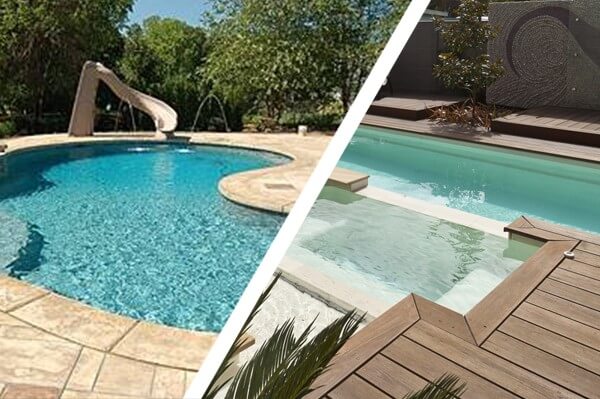Which is better: concrete or fiberglass pools?

Understanding Concrete Pools
What Are Concrete Pools?
Concrete pools, often referred to as gunite or shotcrete pools, are built by spraying a mixture of concrete and sand onto a rebar framework. After the concrete cures, the pool is finished with plaster, tile, or pebble-lined surfaces. These pools are fully customizable and can be constructed in unique shapes and sizes to suit your backyard’s layout.
The construction process involves excavation, creating a rebar framework, applying the concrete, and finishing with a surface layer. This extensive process can take several months to complete.
Pros of Concrete Pools
- Customizable Design
Concrete pools offer the ultimate design freedom. You can create any shape, depth, or size you desire, making them ideal for homeowners with specific aesthetic visions. Whether you want a natural lagoon-inspired pool or an infinity-edge masterpiece, concrete can bring your dream to life.
- Long Lifespan
With proper maintenance, concrete pools can last for decades, often outliving their fiberglass counterparts.
- High Durability
Concrete pools are tough. They can withstand extreme conditions, including heavy use, fluctuating temperatures, and even seismic activity.
Cons of Concrete Pools
- Expensive Upfront Cost
The initial investment for a concrete pool is significantly higher than a fiberglass pool. Custom designs, materials, and lengthy labor all contribute to this cost.
- Longer Installation Time
Expect to wait anywhere from 3 to 6 months for your concrete pool to be completed. The labor-intensive process leaves little room for quick installs.
- Higher Maintenance
Concrete is porous, which makes it susceptible to algae growth. Regular brushing, chemical treatments, and resurfacing (every 10–15 years) are necessary to keep the pool in pristine condition.
Understanding Fiberglass Pools
What Are Fiberglass Pools?
Fiberglass pools are pre-manufactured shells made of fiberglass-reinforced plastic. These shells are constructed in a factory and transported to your property where they’re installed as a single piece. The inside surface is coated with a smooth gel, giving it a sleek finish that’s resistant to algae and wear.
Once delivered, the pool is placed into the pre-dug excavation site and secured with a backfill substance. The process is much faster than building a concrete pool.
Pros of Fiberglass Pools
- Quick Installation
Because fiberglass pools are pre-fabricated, installation typically takes just 1 to 2 weeks.
- Low Maintenance
The smooth gel coat surface resists algae, meaning fiberglass pools require fewer chemicals and less scrubbing. This translates to lower maintenance costs over time.
- Smooth Surface (Comfortable and Algae-Resistant)
Fiberglass pools have a non-porous surface that feels smooth underfoot, which reduces the risk of abrasions for swimmers. The finish also resists algae and reduces cleaning effort.
Cons of Fiberglass Pools
- Limited Design Options
Since fiberglass pools are pre-made, you’re limited to the shapes and sizes available from the manufacturer. This can be a drawback for those wanting a custom design.
- Size Restrictions
Transportation limitations mean fiberglass pools are typically no wider than 16 feet. For those with large spaces or unique layouts, this type of pool may not be a perfect fit.
Comparing Concrete and Fiberglass Pools
Cost Comparison
- Initial Investment
Concrete pools are more expensive upfront, with costs often ranging from BDT 1,000,000 to BDT 2,000,000. or more, depending on customization and materials. Fiberglass pools are more affordable, usually starting around BDT 800,000 and may go up to BDT 2,000,000.
- Long-Term Maintenance Expenses
Over time, concrete pools require more investment in cleaning, chemical treatments, and resurfacing, while fiberglass pools have lower maintenance costs due to their algae-resistant surfaces.
Installation Time
- Concrete
Expect 3 to 6 months for installation due to the complex building process.
- Fiberglass
Enjoy a much faster turnaround time of 1 to 2 weeks.
Maintenance and Durability
- Concrete
Requires regular brushing and resurfacing every 10–15 years. Highly durable but more labor-intensive.
- Fiberglass
Easier to care for, requiring minimal scrubbing and fewer chemical treatments. However, it may need resurfacing after 15–20 years.
Aesthetic and Design Flexibility
- Concrete
Allows for unlimited customization in shape, size, and finishes. Ideal for homeowners with unique visions or challenging landscapes.
- Fiberglass
Limited to pre-designed molds, but the available options often include attractive, modern shapes.
Comfort and Safety
- Concrete
Porous surface can feel rough and may cause abrasions to swimmers, especially children.
- Fiberglass
Smooth gel coat surface is comfortable and safe for all ages.
Which Pool Is Right for You?
Ultimately, the choice between a concrete and fiberglass pool comes down to your individual needs, budget, and property.
Choose a concrete pool if:
- You want a fully customized design.
- You’re willing to invest time and money for durability and aesthetics.
- You have a large backyard or unique requirements.
Choose a fiberglass pool if:
- You prefer quick installation.
- You want a low-maintenance pool.
- You’re okay with choosing from pre-set designs.
Take a moment to consider how you’ll be using your pool. Is comfort and convenience your top priority, or do you dream of a one-of-a-kind design? The best pool for you will reflect your lifestyle and long-term vision.
Summing it Up
Concrete and fiberglass pools each come with their own set of strengths and challenges. Concrete pools shine in customized designs and durability, while fiberglass pools win in installation speed and low-maintenance care. The ideal pool for your backyard depends heavily on your budget, timeline, and personal preferences.
Is it time to make a splash in your dream pool? Start your research today and find the perfect fit that will enhance your outdoor space for years to come.
FAQs
Which pool lasts longer: fiberglass or concrete?
Concrete pools often last decades with proper maintenance, but fiberglass can also have a long lifespan (15–20 years before resurfacing) with care.
Are fiberglass pools easier to maintain than concrete pools?
Yes, fiberglass requires less cleaning and fewer chemicals due to its non-porous surface.
Which type of pool is better for cold climates?
Fiberglass pools are more resilient to freezing conditions due to their flexibility, making them better suited for cold climates.
Can I customize the shape of a fiberglass pool?
Not extensively. Fiberglass pools are pre-molded, so you’ll need to choose from the available designs offered by the manufacturer.
Do concrete pools require resurfacing?
Yes, concrete pools generally need resurfacing every 10–15 years to maintain their finish and functionality.
